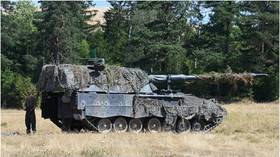NATO budget surges by over a quarter
The sharp increase in spending is a response to the “degraded security environment,” the bloc insists
NATO member states have agreed to increase the alliance’s budget for 2023 by over 25%, the military bloc announced on Wednesday. The US-led alliance justified the move by referring to the ongoing conflict between Moscow and Kiev.
The decision was motivated by the “degraded security environment” caused by the Ukraine crisis, according to the military bloc’s statement.
“I strongly welcome the agreement of NATO’s civil and military budgets for 2023,” NATO Secretary-General Jens Stoltenberg said, asserting that “only North America and Europe, working together in a strong NATO, can keep our one billion people safe in a more dangerous world.”
The ‘civil’ budget has been set to €370.8 million ($396.1 million), while the military spending is set to reach €1.96 billion. The figures constitute a sharp increase compared to 2022, up by 27.8% and 25.8% respectively.
The budgets represent the spending of the organization itself, with the ‘civil’ part covering “funds for personnel, operating costs, and program expenditures of NATO’s Headquarters and its International Staff.” The military budget is meant to cover the cost of “NATO Command Structure headquarters, missions, and operations around the world.”
The third commonly funded element, the NATO Security Investment Programme (NSIP), which covers construction costs as well as “command and control system investments,” has also received a boost. The NSIP cap has been set to €1 billion, representing a 26.6% increase.
The sharp uptick in spending for the bloc’s jointly-funded activities comes as multiple member states have pledged to spend more on defense individually, citing the need to replenish weapons stockpiles, which have been thinned-out by continuous support for Kiev.
They have also claimed the need to boost their capabilities in the face of the alleged “Russia threat.” The US alone has approved a record-breaking budget of some $848 billion, with some $800 million specifically allocated to aid Ukraine.
Russia has repeatedly raised concerns over the ever-growing NATO bloc, the eastward expansion of which has been openly named by Moscow as a prime threat to its security.
“NATO expansion remains the main driver for the West in relations not only with Russia, the post-Soviet countries and the former Warsaw Pact nations, which are already almost all absorbed by the alliance, but also, in general, in relations with other regions of the world,” Russia’s Foreign Minister Sergey Lavrov said last week.






Comments are closed.